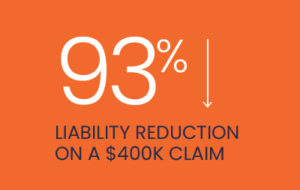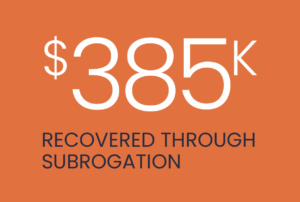
The Kentucky Association of Counties (KACo) Workers’ Compensation Fund sought to improve how workplace injuries are reported and managed across its member organizations. Delays in reporting, nonresponsive injured workers, and rising medical costs made it difficult to maintain timely and effective injury response. By partnering with Charles Taylor to implement a 24/7 Nurse Triage program, KACo introduced a faster, more supportive, and more consistent approach to injury management.
Prior to the launch of the Nurse Triage program, KACo faced significant delays during the earliest stages of the claims process. Reporting lag frequently slowed down the initiation of new claims. Injured workers often waited too long for the first point of contact, resulting in delays in medical care, slower recovery, and higher medical costs. These delays also extended the amount of time claims remained open, affecting both the recovery timeline and claim closure. It became clear that KACo needed a more immediate and dependable system that supported workers the moment an injury occurred while establishing consistent early direction for medical care.
After partnering with Charles Taylor, KACo introduced a 24/7 Nurse Triage program that provided injured workers with real-time access to licensed nurses trained to evaluate injuries, guide care decisions, and begin the reporting process without delay. The program ensured that workers received immediate support and clear next steps, which improved their experience and reduced unnecessary escalation of care. Nurses also conduct follow-up calls within 24 hours, offering reassurance and reinforcing treatment guidance. By incorporating the Nurse Triage program, KACo strengthened the consistency of early care decisions and created a streamlined process that improved both clinical and administrative outcomes.
KACo achieved a 72% reduction in medical bill review costs within the first year of the Nurse Triage program.
The introduction of 24/7 Nurse Triage delivered measurable improvements across KACo’s workers’ compensation program. Reporting lag was reduced by 50%, and injured workers’ first contact time was 42% faster, which improved early care coordination and strengthened the overall experience for claimants. Medical bill review costs decreased by 72% as injuries were routed to the appropriate level of care from the start. Claims remained open 30% fewer days, and fewer injuries required hospital or ER treatment due to more accurate early guidance and follow-up. Through this collaboration, Charles Taylor helped KACo build a more streamlined and consistent process that improved both clinical and administrative outcomes and created a more efficient, cost-effective, and supportive injury management framework for counties across Kentucky.
For over 20 years, Charles Taylor has delivered comprehensive claims services to one of Kentucky’s largest public-sector programs, supporting over 600 county entities including emergency services, law enforcement, and public health. This long-term partnership spans multiple lines of business and is built on strategic claims handling, collaboration, and consistent results.
A civil rights lawsuit was filed against one of the client’s correctional facilities, involving allegations of inadequate medical care during incarceration that the claimant asserted led to lasting health issues. Despite alleging over $15 million in damages, including more than $900,000 in past medical costs, the claim presented substantial uncertainties around liability and the medical basis for long-term impairment.
Charles Taylor guided the litigation to resolution by evaluating the medical history, framing the long-term financial exposure, and recommending a structured settlement plan that balanced the claimant’s care needs with the client’s financial limits.
This strategy positioned the client for successful mediation, ultimately resolving the claim for $2.25 million, an 85% reduction from the original demand and 25% below the client’s authorized settlement authority.

This resolution demonstrates the value of having an experienced claims solutions provider that can manage high-stakes litigation with strategic focus and financial discipline. Achieving an outcome that reduced potential payout by 85% underscores Charles Taylor’s ongoing commitment to delivering tailored solutions that support each client’s long-term risk strategy. Charles Taylor brings the experience, structure, and partnership needed to resolve challenging claims with measurable results.

The City of Aspen and the Aspen Pitkin County Housing Authority (APCHA) faced a high-profile lawsuit concerning structural issues at the Centennial affordable housing complex. The Charles Taylor Engineering Technical Services (CTETS) team was engaged to provide an independent cost assessment and expert structural design review to support the clients. Charles Taylor’s involvement played a key role in resolving this decade-long legal dispute.
 Challenge
ChallengeThe Centennial Homeowners Association filed suit against the City of Aspen, APCHA, and Pitkin County, alleging long-standing structural defects in the 92-unit affordable housing complex. The claims included water intrusion, structural deterioration, and mold concerns that raised questions about long-term safety and livability.
As the case progressed, the claimant proposed significant changes to deed restrictions and presented a repair estimate for approximately $16 million. With financial exposure and public interest at stake, the matter required a clear, objective evaluation of the proposed repairs to support resolution.

The Charles Taylor Engineering Technical Services team provided technical expertise across two core areas. A detailed cost evaluation was conducted by the CTETS building consultant to challenge the accuracy and appropriateness of the $16 million estimate submitted by the claimant. In parallel, a structural engineer from the CTETS team conducted a design review to assess which elements were necessary to address the identified building deficiencies and which proposed repairs extended beyond what was structurally required. This work established a defensible scope and cost of repairs, helping guide negotiations and shape the final settlement. The case ultimately resolved for $7.5 million, resulting in savings for the client ofapproximately $8.5 million.

The Charles Taylor Engineering Technical Services team played a pivotal role in resolving a complex, decade-long legal dispute involving significant structural issues at an affordable housing complex. Through expert detailed cost analysis and design review, the team helped reduce the claimant’s $16 million estimate to a final settlement of $7.5 million. This 53% savings limited financial exposure and ensured that essential repairs could proceed with clarity, accountability, and technical precision. This outcome reflects Charles Taylor’s commitment to delivering trusted expertise and exceptional service in support of complex challenges.
For more than two decades, Charles Taylor has served as the claims solutions provider for one of Kentucky’s largest public-sector programs, supporting more than 600 county entities across local government operations, emergency services, public health, and law enforcement. This trusted relationship is built on collaborative strategy, disciplined execution, and outcomes that protect public resources.
A premises liability lawsuit was filed against the client after a claimant alleged injuries from stepping into an open water meter hatch located on public property. Although the lawsuit demanded close to $400,000 in damages for medical costs, pain and suffering, and lost income, the claim raised considerable uncertainty regarding both liability and the severity of the alleged harm.

Charles Taylor worked with the client to evaluate the claim and challenge the credibility of the allegations, including the extent of the reported injuries and whether a reasonable person would have recognized and avoided the alleged hazard. By identifying critical weaknesses in the claimant’s position and applying a focused litigation strategy, the team positioned the matter for efficient resolution.
The case settled at mediation for $26,000, a 93% reduction from the original demand, avoiding the cost and uncertainty of trial while protecting public funds and delivering a clear financial win for the client.
This case highlights the value of an experienced claims partner with the structure and strategic insight to minimize public-sector liability. Charles Taylor’s proactive guidance and collaborative approach contributed to a fast, favorable resolution that preserved public funds and reduced legal risk.
Charles Taylor remains committed to helping clients reduce exposure, streamline claims resolution, and protect long-term financial outcomes.

The Motz Group, a leading provider of sports turf solutions, was named among the recipients of the prestigious Theo Award, which honors organizations demonstrating excellence in workers’ compensation, injury prevention, and program innovations across industries.
This recognition highlights The Motz Group’s success in reducing incidents, improving safety outcomes, and managing claims more effectively. In partnership with Charles Taylor, the company formalized its safety program and cultivated a proactive risk management culture, leading to measurable improvements.
As the Motz Group expanded, safety risks grew, particularly hand injuries from turf installation, leading to more workers’ compensation claims. The company lacked a formal safety program to address industry-specific risks and ensure compliance across job sites. Additionally, there was a need to improve employee training, hazard recognition, and safety awareness.
With Charles Taylor’s support, the Motz Group strengthened its safety culture by developing a comprehensive Safety Management System with clear guidelines for field employees. Mandatory safety orientations and regular training reinforced safe practices, emergency protocols, and hazard identification. Site inspections were increased to proactively address hazards, with employees encouraged to participate. In response to hand injuries, the company introduced cut-resistant gloves, significantly reducing injuries.

In partnership with Charles Taylor, The Motz Group achieved measurable safety improvements that contributed to their Theo Award recognition. The average number of safety issues identified during inspections dropped by more than half, from 5.67 to 2.52 per visit. The percentage of negative safety observations fell from 14% to under 6%, and hand injuries were reduced by 75% after introducing cut-resistant gloves. These results reflect the impact of a formal safety program and a proactive approach to risk management.
 WeGo Public Transit, Nashville’s primary transportation provider, was named among the recipients of the prestigious Theo Award, which honors organizations demonstrating excellence in workers’ compensation, injury prevention, and program innovations across industries. In partnership with Charles Taylor, WeGo transformed its claims processes, achieving greater efficiency, faster employee recovery, and significantly reduced costs.
WeGo Public Transit, Nashville’s primary transportation provider, was named among the recipients of the prestigious Theo Award, which honors organizations demonstrating excellence in workers’ compensation, injury prevention, and program innovations across industries. In partnership with Charles Taylor, WeGo transformed its claims processes, achieving greater efficiency, faster employee recovery, and significantly reduced costs.
WeGo faced challenges in managing its workers’ compensation program, including high claims volume, rising costs, and inefficiencies in claims resolution. Slow return-to-work times delayed recovery and impacted operations. The program lacked streamlined processes, resulting in delays and higher medical and legal expenses. WeGo needed to overhaul its approach to improve outcomes, reduce costs, and accelerate claims resolution.
In October 2023, WeGo transitioned to Charles Taylor as their Third-Party Administrator (TPA). Key improvements included integrating safety technology, such as cameras on buses and terminals to verify and dispute claims, reducing costly investigations. WeGo increased claims reviews with management and defense counsel to address high-exposure cases quickly. Early diagnostic tools like MRIs and CT scans detected injuries sooner, speeding recovery and reducing medical costs. A new transitional duty program facilitated faster return-to-work for employees.

After partnering with Charles Taylor, WeGo Public Transit significantly improved its workers’ compensation program. The number of lost time claims fell by 14%, and total lost workdays dropped by 21%, reflecting faster and safer return-to-work outcomes. Claims closures increased by 42%, helping the team resolve cases more efficiently. At the same time, the average cost per lost time claim decreased by 36%, and medical only claims were reduced by 39%. These results contributed to their Theo Award recognition and underscore WeGo’s commitment to employee recovery, operational efficiency, and cost control.
For more than two decades, Charles Taylor has served as the claims solutions provider for one of Kentucky’s largest public-sector programs, supporting more than 600 county entities across emergency services, law enforcement, fiscal courts, and public health. This long-standing partnership is built on proactive strategy, collaborative defense coordination, and results that protect public resources.
 The Liability Claim
The Liability ClaimA premises liability lawsuit was filed against a county medical facility after a claimant allegedly tripped over a bed while exiting the building and sustained injuries.
Despite demanding more than $1.2 million in damages, including punitive damages and compensation for pain and suffering, the claim presented significant questions around liability and the extent of the alleged injuries.
Charles Taylor worked with the client to evaluate the claim, review the claimant’s allegations, and question the validity and extent of the reported injuries. The team also raised concerns about the credibility of the claim and whether a reasonable person would have recognized and avoided the alleged hazard.
This approach led to a settlement of $20,000 at mediation, just a fraction of the $1.2 million originally demanded, protecting public funds and demonstrating the value of experienced claims handling.

This resolution demonstrates the value of having an experienced claims solutions provider that can navigate complex liability claims with strategic focus and disciplined advocacy. Achieving an outcome that reduced potential payout by more than 98% underscores Charles Taylor’s commitment to protecting public funds and supporting each client’s long-term risk strategy. Charles Taylor brings the experience, structure, and partnership needed to resolve challenging claims efficiently and deliver measurable results.
For more than two decades, Charles Taylor has delivered comprehensive claims services to one of Kentucky’s largest public-sector programs, supporting over 600 county entities including emergency services, law enforcement, and public health. This long-standing partnership spans multiple lines of business and is built on a foundation of strategic claims handling, collaboration, and results-driven execution.

A county initiated a roof replacement project at a large early childhood education center. The contracted roofing company failed to implement adequate protections during installation. When heavy rain swept through the area, insufficient temporary coverings led to extensive interior water damage across classrooms and office spaces.
Despite clear indications of negligence, the contractor denied responsibility for the loss, and its insurer refused to provide coverage. As a result, the client was left facing an uncovered property claim of approximately $450,000.

Charles Taylor managed the property claim and launched a focused subrogation investigation into the contractor’s on-site protocols and mitigation efforts. The review revealed that proper precautions had not been taken to secure the worksite, providing a clear basis for liability.
Charles Taylor applied a targeted subrogation strategy, combining liability analysis with detailed documentation to negotiate directly with the contractor’s insurer. Through persistent follow-up and expert positioning, the team secured a $385,000 recovery, covering 85% of the client’s original payout.
Instead of absorbing the cost of a preventable loss, the client recovered the majority of damages, preserving public funds and holding the responsible party accountable. This resolution demonstrates the value of working with a claims solutions provider that proactively pursues recovery opportunities and navigates complex property claims with precision and efficiency to deliver measurable financial results.
Charles Taylor remains committed to helping clients minimize loss, reduce exposure, and strengthen long-term outcomes across every line of business.
When tragedy strikes, the path to recovery is rarely simple, especially when insurance complexities and budget constraints come into play. That’s exactly what happened to a Pennsylvania church following an arson fire. As part of a self-insured church conference, the organization faced significant financial challenges in the wake of the disaster. With excess insurance coverage not yet triggered due to the conference’s annual aggregate not being met, the financial burden of rebuilding fell directly on the church.
As rebuilding plans got underway, the church’s architect and contractor identified a number of upgrades they believed were necessary to meet current building codes. These included a sprinkler system, handicap ramp, and elevator, totaling an estimated $200,000.
While these upgrades were intended to bring the new structure up to code, there was uncertainty about whether they were truly required. With insurance limitations in play, the church was facing the prospect of covering this large expense out of pocket. The challenge was clear: determine which upgrades were legally mandated while keeping reconstruction financially feasible.
To solve this complex issue, Charles Taylor deployed a collaborative team of Adjusting and Engineering Technical Services experts. Together, they launched a comprehensive investigation that went far beyond standard claims adjusting.
By conducting in-depth research and reviewing local building codes in detail, the team was able to assess the actual legal requirements for the rebuild. Their findings were compiled into a robust technical memorandum, which supported the position that the proposed upgrades were not legally necessary.
The team’s clear, defensible documentation and unified approach were instrumental in gaining approval from local building authorities. Ultimately, the church was allowed to rebuild to its pre-loss condition, without the costly additions.
Thanks to Charles Taylor’s strategic cross-functional collaboration, the church conference avoided $200,000 in unnecessary rebuilding costs. With excess insurance not yet triggered, this outcome represented a direct financial win for the client, one that preserved budget and accelerated recovery.
This success story is a testament to the power of inter-departmental expertise and proactive problem-solving. Charles Taylor’s ability to bring together field knowledge and technical precision delivered a cost-effective, strategic resolution for the client when it mattered most.
United Dairy Farmers (UDF) is an Ohio‐based convenience store operator and food manufacturer with 170+ retail locations, multistate logistics and warehouse operations, and in-house food production. Known for its ice cream, donuts, fresh hot food, and guest service, UDF faced significant challenges in managing unemployment claims.
UDF struggled to manage high volumes of unemployment claims across its decentralized business model. Frequent hiring and turnover, combined with varying state and local regulations, strained UDF’s internal resources, jeopardized compliance, and drove up costs. The volume and complexity of termination cases made it difficult to sustain a consistent, compliant approach across the organization.
In 2010, UDF partnered with Charles Taylor to centralize its unemployment claims management. We designed a legally informed, location-specific strategy that standardized claim handling across all operations. By streamlining workflows and aligning procedures with each state’s requirements, we brought consistency, control, and efficiency to their program.

“They’re not just processing paperwork and attending hearings. They’re invested in strengthening our program, reducing costs, and delivering results with pride.”
– Donna Hadley, Program Manager, United Dairy Farmers
Learn how Charles Taylor combines strategic unemployment claims management with operational insight and legal expertise to deliver measurable savings and long-term compliance for your organization.